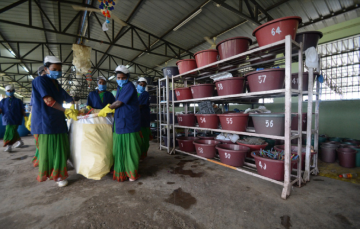
Municipal waste management in Ambikapur was one of the city’s significant challenges. The impacts of the waste mismanagement harmed the health and wellbeing of Ambikapur’s citizens. A new and inclusive approach was needed to clean up the city.
In 2014, 17 administrative wards in Ambikapur were chosen to pilot a new decentralized strategy by setting up Solid Liquid Resource Management (SLRM) centres. The strategy focused on empowering less privileged women through training on a variety of technical and soft skills related to waste management, including how to properly and hygienically dispose of and sort waste. These women were encouraged to form Self Help Groups (SHG) that acted to collect, process, and recover valuable components from waste at SLRM centers. Segregated wet waste was processed into compost, and dry waste was sold to recycling centers depending on the type of waste. The female workers were paid from the user fees for waste collection, as well as based on the value of the recycled materials.
Guiding principle #6 Avoiding Equity, Inclusiveness, and Empowerment, from the International Good Practice Principles for Sustainable Infrastructure.



